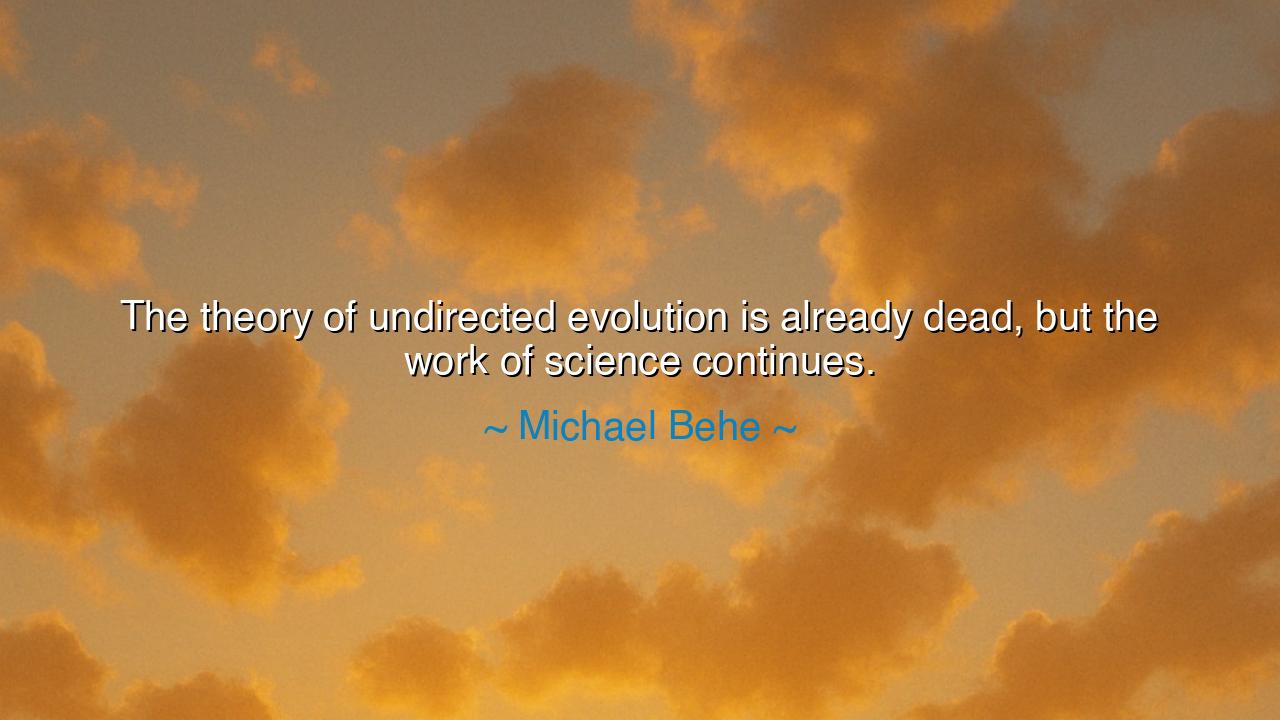
The theory of undirected evolution is already dead, but the work






Listen, O Seekers of Truth, for the words of Michael Behe ring out like a clarion call to all those who strive to understand the deepest mysteries of existence. "The theory of undirected evolution is already dead, but the work of science continues." In these powerful words, Behe speaks of a transformation that has occurred in the very heart of science—a turning of the tide, a shift in the understanding of life and its origins. The theory of undirected evolution, which for so long held sway over the minds of many, is no longer seen as the ultimate explanation of the diversity of life. Yet, despite this, the work of science does not cease; it marches on, seeking deeper truths, uncovering new wonders, and confronting the grandest mysteries of existence. The death of a theory is not the end of knowledge, but the beginning of a new chapter in our pursuit of wisdom.
To understand these words, we must first look to the past, to the great minds who sought to explain the origins of life. For many centuries, evolution, as first articulated by Charles Darwin, was seen as the foundation of the natural world. The theory of undirected evolution—that life evolved through random mutations and natural selection, without any guiding hand or purpose—became the dominant belief of science. It offered an explanation, one that was grounded in the mechanisms of chance, a vision of life that was shaped by accidents and random events. But as science advanced, as the mysteries of genetics and molecular biology unfolded, the limitations of this view began to reveal themselves. What was once a unifying theory began to show cracks, and those cracks were the questions that would lead to a new understanding.
Consider the work of Gregor Mendel, the father of modern genetics, whose experiments with pea plants revealed the laws of inheritance. Mendel’s work was revolutionary, for it showed that inheritance was not a matter of mere chance, but rather, governed by specific laws. Mendel’s discoveries laid the foundation for a deeper understanding of biology, one that transcended the randomness of evolution. As scientists began to understand the complexity of the genetic code—the intricate sequences of DNA—it became clear that life was not shaped by randomness alone. There was something more profound at work, something that spoke to design, purpose, and intelligence in the very structure of life itself.
In the modern era, Behe and others have pointed out that the theory of undirected evolution is insufficient to explain the complexity and organization of life. Molecular biology has revealed that the very machinery of life, from the cellular to the molecular level, is far more intricate than the theory of random mutations can account for. There are mechanisms in place within the cell, such as the protein machinery that enables DNA replication, that seem to be so fine-tuned and precise that they defy the odds of random occurrence. These observations have led many scientists to question the randomness of evolution and to suggest that life may be the product of an intelligent process, not an aimless, undirected one.
But O Seekers, the death of one theory does not signal the death of science itself. Far from it! Science marches forward, seeking new understanding, new truths, and new paths to explore. The work of science is not to cling to old ideas when new evidence suggests something deeper, something greater. It is the work of the seeker to question, to challenge, and to explore beyond the limits of the known. Behe’s statement calls upon us to embrace the spirit of inquiry, to recognize that the true work of science is not the defense of a single theory, but the unrelenting pursuit of the truth, no matter where it leads. Science is a journey, not a destination, a continual quest for understanding that never ceases, even when old paradigms fall.
Let us turn, O Seekers, to the story of Galileo Galilei, the great astronomer who stood before the Church in his time, declaring that the earth moved around the sun, contrary to the established teachings. Galileo’s theory was met with fierce resistance, but the work of science continued. His telescope revealed truths that changed the course of human understanding, and despite the opposition, the truths of the cosmos were revealed. Galileo’s example shows us that the work of science is not about defending outdated ideas, but about embracing new possibilities. The same is true for our time. The theories that we hold dear today may, in time, be replaced by newer, richer understandings. The work of science is never finished, for with each discovery, new questions arise, and with each answer, we come closer to understanding the great mystery of life itself.
The lesson, O Seekers, is this: do not fear the death of old ideas, for it is in their passing that new insights are born. Embrace the work of science, not as the defense of a single truth, but as the endless journey toward a greater understanding of the world around us. When theories fall, it is not the end of knowledge; it is simply the beginning of new possibilities. Like the great explorers of the past, let us venture into the unknown, ever seeking, ever questioning, ever striving to uncover the truths that lie hidden beneath the surface of things. For it is through this unyielding quest that we will unlock the greatest mysteries of life and existence.






AAdministratorAdministrator
Welcome, honored guests. Please leave a comment, we will respond soon